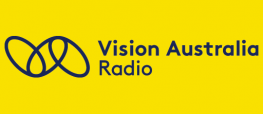
Vision Australia Radio's podcast series traces individual’s first year after vision loss
One person’s honest journey of the first year of his life after vision loss is the subject of a new podcast series produced by Vision Australia Radio.
The series, titled ‘An Interesting Place to Be’, follows the story of Martin Wright who lost his vision while driving home from dropping his wife off at the hospital where she was having shoulder surgery.
“The next day we were standing in the kitchen,” says Martin. “We were unable to make our dinner because she couldn’t lift anything and I couldn’t see. I thought, well this is an interesting place to be.”
Podcast producer and host, Stella Glorie, says that this droll summation is typical of Martin’s self-effacement and bellies the surreal and traumatic experience of losing your vision.
“Martin is a deep-thinking, gracious and funny man. He was completely open to talking to me and sharing his story. The series allows people to get to know Martin, his wife, Pat, his family and learn about how his vision loss has impacted on his life.”
The series builds on the specialist knowledge that Vision Australia provides, to shed light on the complexities of vision loss. While the podcasts aim to assist people who might be facing their own vision loss and to educate the general public, Vision Australia Radio Network Manager, Conrad Browne says the personal narrative of Martin’s story will resonate with many people.
“But this is not just about vision loss. This is a story of how one person navigates the ups and downs of coming to terms with a life changing situation. Through sharing stories like Martin’s, Vision Australia Radio is continuing its commitment of direct engagement with the blindness and low vision community and their stories.”
Episodes include Martin explaining how he continued to drive home after losing his vision, the freedom that came from using a white cane and taking care of grandchildren when you can’t see them. The podcasts are available on Vision Australia Radio’s website with new episodes uploaded monthly.
Key Vision Australia/blindness and low vision figures:
- Vision Australia estimates there are 384,000 people in Australia who are blind or have low vision. Of these 37,000 (approx. 10%) are blind and 347,000 (approx. 90%) have low vision (refractive error not included)*.
- The blind and low vision population in Australia (refractive error not included) grew by 7.6% to 384,000 (2016 population estimate) from 357,000 (2013 population data)*.
- Vision Australia predicts there will be 564,000 blind and low vision people in Australia by 2030, based on ABS population projections (refractive error not included)*.
Vision Australia is a leading national provider of blindness and low vision services in Australia. We work in partnership with Australians who are blind or have low vision to support them to live the life they choose.
We support more than 26,000 people of all ages and life stages, and circumstances. We do this through 28 Vision Australia centres in Victoria, New South Wales, the Australian Capital Territory, Queensland, South Australia and Western Australia and through outreach programs in the Northern Territory and Tasmania.
Facebook comments